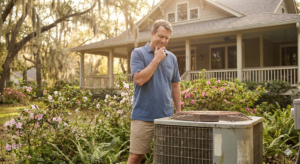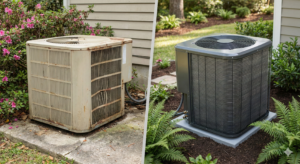Living in the Lowcountry offers beautiful views and a warm climate that many folks love. But with these perks comes the challenge of high coastal humidity. This sticky air isn’t just uncomfortable; it affects living spaces and household appliances like heating, ventilation, and air conditioning (HVAC) systems. In homes near the coast, humidity can be a constant concern, making it important for homeowners to know how it plays a part in the comfort of their home.
Coastal humidity can make hardworking HVAC systems struggle, leaving them unable to operate at peak performance. If you’ve ever felt like rooms just can’t seem to stay cool or noticed sudden jumps in energy bills, it might be related to the muggy air creeping in. By understanding how humidity affects HVAC systems, homeowners can take steps to ensure their home remains cozy and energy-efficient, no matter the weather outside.
How Coastal Humidity Impacts HVAC Systems
High levels of humidity put a burden on HVAC systems, making them work overtime. When the air is saturated with moisture, HVAC units must exert more effort to balance temperatures and humidity levels inside the home. This extra load can cause parts to wear out faster and use more energy, which may lead to higher costs.
- Increased Wear and Tear: As systems strive to manage heavy moisture levels, they run longer to maintain desired temperatures. This constant use can cause early wear on components, sometimes leading to expensive repairs or a shorter lifespan for the unit.
- Reduced Efficiency: Humid air makes cooling feel less effective. You might crank up the cool settings, but it could seem like the temperature won’t budge. This happens because humid air holds heat, making it tough for AC units to deliver that crisp, cool feeling we all crave on a hot day.
- Moisture-Related Concerns: Excess humidity can cause problems in the house itself, not just the HVAC system. Condensation on windows, clammy-feeling rooms, or a musty odor might indicate your system struggles to manage moisture.
Keeping an eye on these factors helps homeowners recognize when their HVAC system is under stress. Identifying these issues early can prevent more severe problems down the line. Regular maintenance and professional assistance can ensure systems run smoothly, providing a cool and comfortable home even in the height of summer’s stickiest days.
Signs of Humidity-Related HVAC Problems
Coastal humidity can trigger a handful of familiar red flags in your HVAC system. If you know what to look for, you can catch trouble early before it turns into a bigger issue. One of the simplest signs is the system turning on and off more often than usual. This frequent cycling burns extra energy and puts extra pressure on the unit.
Another thing to watch for is an unusual rise in energy bills without a clear reason. If your HVAC is running longer to battle thick, sticky air, it’ll reflect on your monthly utilities. Temperature inconsistencies across different rooms are another signal. The bedroom could feel like a sauna while the living room stays cool.
Other warning signs include:
- A musty or damp smell, especially near vents or in rooms that feel stuffy
- Increased dust or indoor allergens that recirculate despite cleaning
- Frost or condensation inside the indoor unit or ductwork
- Water pooling near your unit
If you spot moisture buildup around your windows or along interior walls, the HVAC system might not be removing enough humidity. Letting these signs go unchecked may allow mold growth or damage to furniture and walls. High humidity silently wears down your system and the comfort of your home over time.
Preventive Measures and Pro Tips
When it comes to coastal humidity, prevention goes a long way. You don’t need to wait for things to break down before taking action. Simple steps can help HVAC systems stay on track and keep your home feeling dry and cool.
First, schedule professional maintenance at least once a year. Trained technicians can clean out clogs, check for leaks, and inspect the major parts before peak heat and humidity hit. This small step can make a big difference in how well the system keeps up.
Other helpful moves homeowners can make include:
- Installing a whole-home dehumidifier to help the system manage moisture
- Making sure all vents and registers are open and not blocked by furniture
- Checking doors and windows for air leaks that let in moist outside air
- Keeping the airflow steady inside the home by using ceiling fans
Even using your bathroom and kitchen exhaust fans makes a difference. It pulls out damp air that would otherwise stick around. While these efforts help, they work best when paired with professional support. Technicians can spot the little issues that might slip through, like small leaks in ductwork or a failing condensate pump.
The Benefits of Professional HVAC Services
Professionals bring more than just tools—they bring peace of mind. High humidity can be tricky, and an experienced tech knows what signs to look for that aren’t always obvious. Whether it’s fine-tuning your thermostat settings or identifying worn-out parts, skilled service keeps your system from falling behind.
Routine check-ups done by a professional can stretch the life of your HVAC system. Instead of guessing why your home feels sticky or why the AC runs non-stop, a trained eye can diagnose and solve the real issue right away. That means fewer repair calls and cooler months ahead.
Another plus is better indoor air quality. When HVAC systems work well, they filter and circulate cleaner air. That means less dust, less discomfort, and fewer moisture-related problems like warped wood or mildew smells.
In humid areas like the Lowcountry, hiring help isn’t a luxury—it’s part of making sure your home stays a place you actually want to be during the summer.
Enjoy Comfortable Living in the Lowcountry
Coastal living has its perks, but the humidity definitely puts HVAC systems to the test. From higher indoor moisture to less efficient cooling, it’s easy for things to feel off balance fast. Recognizing signs early and taking action keeps your system working better, longer.
Teaming up with trusted pros helps fix small issues before they turn into bigger breakdowns. With just a few smart steps, you can enjoy year-round comfort even on the stickiest summer days. Your home should be a place where you breathe easy, and that starts with keeping everything behind the scenes running right.
If your home’s comfort has taken a hit lately, it might be time to address the root of HVAC problems caused by coastal humidity. Let the experienced team at Coastal Carolina Comfort help you get ahead of moisture-related issues and keep your system running strong all season long.


